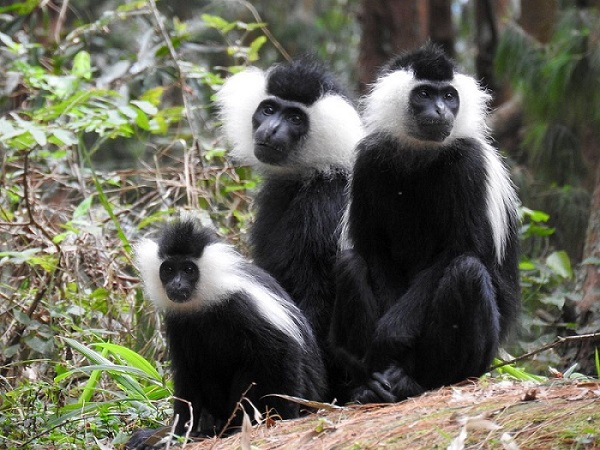
Nyungwe national park, is one of Rwanda’s four parks. It is a destination of primates, having up to 13 species recorded there. The most popular are the chimpanzees and the chimpanzee trekking is the most popular tour in Nyungwe forest.
Apart from the chimps, there are several species of monkeys in Nyungwe National Park and one of the special monkeys in Nyungwe forest is the Rwenzori Colobus (Colobus angolensis rwenzori), a subspecies of the Angolan Colobus monkey (Colobus angolensis) species – an attractive Old World monkey with distinctive black-and-white coat, tufty shoulder-pads and a mohawk.
The Angolan colobus monkeys (Rwenzori colobus monkeys) in Nyungwe tend to form huge groups, called “supergroups”, of more than 500 individuals, a phenomenon that has been observed to happen only among the colobus monkeys in Nyungwe National Park. Nyungwe National Park in Rwanda, therefore, offers the best sightings of the colobus monkeys in the world.
It is a beautiful wildlife adventure approaching a large group of these colobus monkeys and watching these lovely monkeys that are very active and social, that do a lot of playing with each other and grooming when they are not swarming branches of a fruiting tree, or lining up on the bark and branches of an old tree to eat off the lichens, or covering an entire lush green ground in black and white when they come down from the trees to eat some herbs and clay.
During the time with the colobus monkeys, you stand a high chance of seeing other monkey species as well that make it a habitat of joining big colobus groups. The commonly sighted monkeys with the colobus monkeys are; the Blue monkeys, Mona monkey, and Mangabey monkey. These are normally in smaller groups of a few individuals and probably join the large colobus monkeys for added protection from predators, especially the chimps.
Uwinka and Gisakura colobus monkeys groups.
Two groups of colobus monkey have been habituated for colobus monkey tours in Nyungwe National Park. The colobus tracking trip allows one hour with the monkeys after finding them. You can also spend a full day with the monkeys if you are a photographer, and these monkeys are such a photography delight!
One of the two habituated groups is a supergroup of 500+ colobus monkeys and their territory is in Uwinka which is also the location of the park’s visitors’ center or head office.
The second group of habituated Colobus monkeys is not a supergroup with a much smaller number of monkeys of about 60 individuals. This group is located in Gisakura area.
The Gisakura group is the most visited for the trekking trips because it is easier to find without much trekking, and often the monkeys are hanging out near the edge of the forest. Gisakura (outside the park) is also the location for most lodgings used for stays when visiting Nyungwe National Park for trips, such as Nyungwe Top View Hill Lodge, One&Only Nyungwe House, and Gisakura Guesthouse among others. As such it is very conveniently located.
The Gisakura colobus monkeys group have four trekking schedules each day; 8am, 10am, 1pm, 3pm. This group is therefore the most suitable if you want to add a short extra activity to chimp tour in Nyungwe National Park.
The Uwinka colobus monkeys supergroup tend to travel widely to look for enough food for the large group. Sometimes it encounters the Mayebe chimpanzee group who live in the Uwinka area and has to flee. Chimps have the colobus monkeys on their menu and actively hunt them for meat. The Uwinka colobus often flee to farther territories to escape the chimps.
The Uwinka colobus group have one schedule in a day at 9am because the experience can take a full day depending on where the monkeys would have traveled to. Unlike the Gisakura group that can be done as an extra activity on the same day with another activity in Nyungwe, the Uwinka group needs a day of its own allocated.
The Uwinka group is great if you want to spend a full day of photography with the colobus monkeys in Nyungwe National Park.
Cost of the colobus monkey tracking in Nyungwe National Park
| Foreign Non-resident | Foreign Resident | Rwandan Citizen |
| USD 60 | USD 40 | RWF 5000 |
Age limit: Only persons aged from 12 years are allowed to do the colobus monkey tracking, below this age a person is not allowed to join the walk.
Cost of full day photography with the Colobus Monkeys in Nyungwe forest
600USD per group per day
After one day, additional days are paid 50%
Level of fitness required for the colobus monkey trekking in Nyungwe
Basic fitness is okay enough if you are visiting the Gisakura group. However if you are planning on tracking the Uwinka group you need to be fit as there may be a lot of hiking up and down hills and through think vegetation.
The best time to visit the colobus monkeys in Nyungwe National Park
The monkey trek can be done throughout the year. However the drier months (dry season) is the most favorable fore trekking which is December to February, and June to mid-September. During the rainy seasons, April – May, and October – November, the terrain is slippery hence a more difficult trek.
What essential items do I need for the colobus monkey trek
- Hiking shoes with good traction
- Rain jacket
- Long sleeved shirt and long pants to protect skin from prickly plants
- Insect repellent
- Sunscreen
Would you like to see the Colobus monkeys in Nyungwe? Well you can book one of these trips